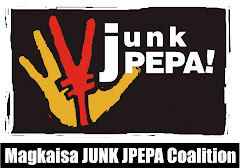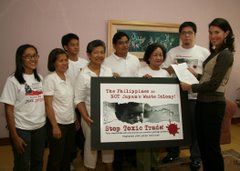
5 May 2008, Pasay City. The planned exchange of diplomatic notes will not repair the injustice and irregularity innate to the controversial Japan-Philippines Economic Partnership Agreement (JPEPA). Rejecting the treaty now is pro-Filipino.
This is the unequivocal message of the EcoWaste Coalition and the Magkaisa Junk JPEPA Coalition (MJJC) as they peaceably assemble outside the Senate of the Philippines to campaign for the rejection of JPEPA now, and thwart what they view as a dubious scheme to “fix” the constitutional, economic and other infirmities of the treaty with side notes between the governments of Japan and the Philippines.
To put their message across to the Senators and the public, the youth volunteers of the EcoWaste Coalition acted out the people’s anguish over the social, economic and environmental injustice coming out of the badly negotiated agreement and the inadequacy of the side notes to rectify the gross injustice.
Dressed in the colors of the Philippine flag, “Inang Katarungan” (Lady Justice) raised a symbolic scale of justice showing the uneven gains of the contracting states with Japan profiting heavily from JPEPA, a sad fact that a mere exchange of notes, stressed the protestors, cannot remedy.
“We seriously doubt if band-aid measures like the side notes can set right a discredited pact that has dismally failed to serve and protect the sovereign interests of the Filipino people, including our right to a just development and a toxic-free environment,” said Manny Calonzo of the EcoWaste Coalition and the Global Alliance for Incinerator Alternatives.
According to Atty. Golda Benjamin, lead counsel of the MJCC, “We were generous even where we had cause to be stingy with the Japanese. Fish, crustaceans and mollusks are excluded from the WTO Uruguay Round commitments of member countries because developed countries refused to reduce their export subsidies especially those on fishing vessels. Despite this the Philippines still bound its tariffs at the WTO, albeit at very high rates. Japan did not.”

The MJJC complained that of the 200 tariff lines for fish products in Japan’s JPEPA schedule, 59 are forever excluded from duty-free treatment; 15 are for deferred market access negotiations; 72 for phased tariff removal; and, 25 duty free from year 1. Of the 114 in the Philippine schedule, 46 will enjoy duty-free treatment from year 1 while the remaining 68 are subject to phased tariff removal.
Both the EcoWaste Coalition and the MJJC denounced the evident deficiency of the side notes being crafted by the two governments to correct the economic inequities and what they described as “the ultimate form of a national sell-out that is extremely tilted to favor Japanese interests.”
“The approval of JPEPA in its current form will not only cause us to miss the boat but also to drown in a sea of negotiation mistakes. Two wrongs do not make one right. The only choice left for the Senate is the pro-Filipino choice: reject JPEPA now,” the groups asserted.
After the creative protest, the EcoWaste Coalition representatives trooped to the Senators’ offices to provide the lawmakers with the MJJC’s summary of the balance of commitments of the contracting parties that substantiate the groups’ vehement rejection of the lopsided treaty.
Among the groups represented in the latest peaceful protest against JPEPA were the Buklod Tao, Cavite Green Coalition, Concerned Citizens Against Pollution, EcoWaste Coalition, Global Alliance for Incinerator Alternatives, Initiatives for Dialogue and Empowerment through Alternative Legal Services, Mascomthea, Mother Earth Foundation, Sagip Pasig Movement, Sanib-Lakas ng Inang Kalikasan and Zero Waste Philippines.






No comments:
Post a Comment